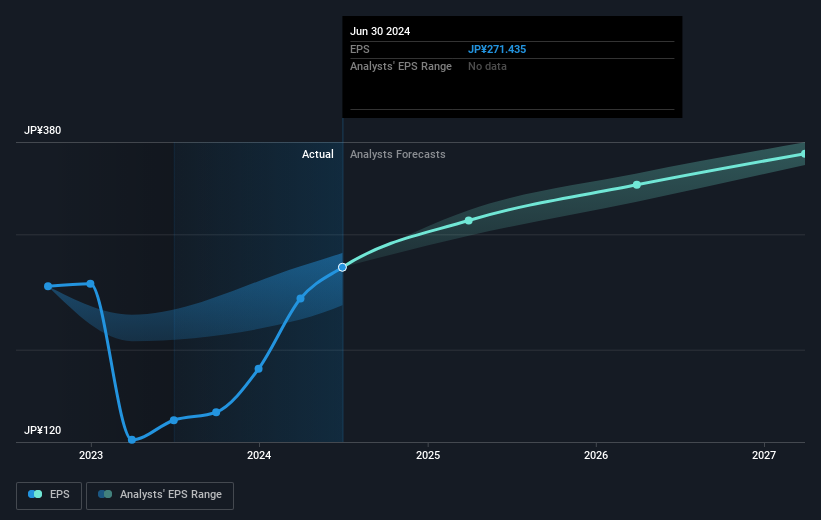Seiko Group (TSE:8050) shareholders YoY returns are lagging the company's 95% one-year earnings growth

Seiko Group Corporation (TSE:8050) shareholders might be concerned after seeing the share price drop 16% in the last quarter. While that might be a setback, it doesn't negate the nice returns received over the last twelve months. Looking at the full year, the company has easily bested an index fund by gaining 65%.
Since the long term performance has been good but there's been a recent pullback of 5.7%, let's check if the fundamentals match the share price.
View our latest analysis for Seiko Group
While the efficient markets hypothesis continues to be taught by some, it has been proven that markets are over-reactive dynamic systems, and investors are not always rational. One flawed but reasonable way to assess how sentiment around a company has changed is to compare the earnings per share (EPS) with the share price.
During the last year Seiko Group grew its earnings per share (EPS) by 95%. This EPS growth is significantly higher than the 65% increase in the share price. Therefore, it seems the market isn't as excited about Seiko Group as it was before. This could be an opportunity.
You can see below how EPS has changed over time (discover the exact values by clicking on the image).

It is of course excellent to see how Seiko Group has grown profits over the years, but the future is more important for shareholders. Take a more thorough look at Seiko Group's financial health with this free report on its balance sheet.
What About Dividends?
When looking at investment returns, it is important to consider the difference between total shareholder return (TSR) and share price return. The TSR is a return calculation that accounts for the value of cash dividends (assuming that any dividend received was reinvested) and the calculated value of any discounted capital raisings and spin-offs. Arguably, the TSR gives a more comprehensive picture of the return generated by a stock. In the case of Seiko Group, it has a TSR of 68% for the last 1 year. That exceeds its share price return that we previously mentioned. This is largely a result of its dividend payments!
A Different Perspective
It's nice to see that Seiko Group shareholders have received a total shareholder return of 68% over the last year. Of course, that includes the dividend. That's better than the annualised return of 11% over half a decade, implying that the company is doing better recently. In the best case scenario, this may hint at some real business momentum, implying that now could be a great time to delve deeper. While it is well worth considering the different impacts that market conditions can have on the share price, there are other factors that are even more important. To that end, you should be aware of the 3 warning signs we've spotted with Seiko Group .
But note: Seiko Group may not be the best stock to buy. So take a peek at this free list of interesting companies with past earnings growth (and further growth forecast).
Please note, the market returns quoted in this article reflect the market weighted average returns of stocks that currently trade on Japanese exchanges.
New: Manage All Your Stock Portfolios in One Place
We've created the ultimate portfolio companion for stock investors, and it's free.
• Connect an unlimited number of Portfolios and see your total in one currency
• Be alerted to new Warning Signs or Risks via email or mobile
• Track the Fair Value of your stocks
Have feedback on this article? Concerned about the content? Get in touch with us directly. Alternatively, email editorial-team (at) simplywallst.com.
This article by Simply Wall St is general in nature. We provide commentary based on historical data and analyst forecasts only using an unbiased methodology and our articles are not intended to be financial advice. It does not constitute a recommendation to buy or sell any stock, and does not take account of your objectives, or your financial situation. We aim to bring you long-term focused analysis driven by fundamental data. Note that our analysis may not factor in the latest price-sensitive company announcements or qualitative material. Simply Wall St has no position in any stocks mentioned.
About TSE:8050
Seiko Group
Engages in watches, devices solutions, systems solutions, apparels, clocks, fashion accessories, and other businesses in Japan and internationally.
Solid track record with excellent balance sheet and pays a dividend.
Market Insights
Community Narratives




